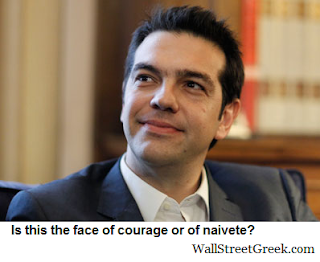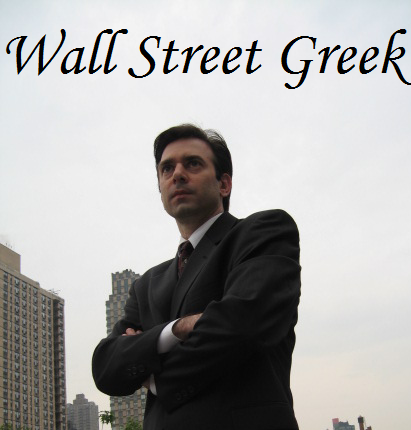From the source that told you
European change still threatened stocks the day of the confounding market rally on the election results in Greece and France, today I am advising that the next move may be higher. What’s killing stocks these last few days is the
wild speak coming from the Greek Syriza Party, which is currently attempting to form a government. What may save stocks, probably only temporarily, will be the inability of Greece’s Radical Left Coalition to form a government, which means the Greeks will get a second chance at deciding their fate in June. Where that leads should be at least clearer, though the direction could be either.
Our founder earned clients a 23% average annual return over five years as a stock analyst on Wall Street. "The Greek" has written for institutional newsletters, Businessweek, Real Money, Seeking Alpha and others, while also appearing across TV and radio. While writing for Wall Street Greek, Mr. Kaminis presciently warned of the financial crisis.
Relative tickers include: Global X FTSE Greece 20 ETF (NYSE: GREK), SPDR S&P 500 (NYSE: SPY), National Bank of Greece (NYSE: NBG), Hellenic Telecommunications (NYSE: OTE), Coca-Cola HBC (NYSE: CCH), Teekay Corp. (NYSE: TK), Navios Maritime Holdings (NYSE: NM), Navios Maritime Acquisition (NYSE: NNA), Navios Maritime Partners L.P. (NYSE: NMM), Tsakos Energy Navigation Ltd. (NYSE: TNP).
Solution for Greece
Also, the ramifications of the Greek decision might not be as clear, traumatic or destructive as people, pundits and even economists describe. For instance, if the euro-zone were to fail completely, which is not as unlikely as the entrenched make it to seem, Greece’s early exit might prove helpful. On the other hand, a fascist state and/or weak leadership would find difficulty navigating the global economic environment. You see, nothing is perfectly black or white in this world, however we may attempt to simplify, and everything can be colored. Furthermore, the best solution for Greece, Europe and the global market should offer wise economic strengthening combined with sensible budget management, or the gray in between today’s two arguments.
Some might say that the premature celebration of Syriza’s Alexis Tsipras has done more to terrify global markets and perhaps even the Greeks who voted for him than to bring positive change so far. The sum I speak of would include PASOK and New Democracy leadership, who will now surely employ fear tactics to retrieve votes lost in the first election. Greece’s citizens have only to look at their stock market, with the Athens Stock Exchange General Index collapsed over the two days following the anomalous trade immediately after the election. The Global X FTSE Greece 20 ETF (NYSE: GREK) is down 13% from May 4th. The iShares S&P Europe 350 Index (NYSE: IEV), down another 1.5% into midday Wednesday, has been edging down on the omens of election polls for weeks. Though,
Europe’s slipping into broad-reaching recession has certainly played a role in that.
While a secondary victory for the establishment might ease market concerns, it’s certainly not a given. On the other end of the spectrum, the disgruntled and disgusted Greek people may line up behind Syriza now. If the many tentacled monster of Greek dissatisfaction were to more perfectly unify, then it is possible Syriza could win the majority. In that case, with the extra 50 seats in Parliament given for the win and the assistance of other parties, it might also form a government. The result of that is clear, based on the emboldened braggadocio of Tsipras. He has stated he will tear up standing agreements with the troika, whose response has also clearly been laid out. It would be the end of the relationship between Greece and Europe, or at least the euro-zone. Greece would default on its debt and return to the drachma.
In my view,
and reiterating yet again, neither of the two extremes needs be the fate of Greece. If the global community which makes up the IMF, and the European Union, intend for Greece’s realistic revival, they would set simpler terms for Greece to payback its debt. An extension of the timeline to payback would allow Greece to more gradually implement sensible austerity measures while also finding creative growth solutions. Instead, Greeks have had deep destructive austerity shoved down their throats. The economic feedback would not be harsh my way, and upheaval in Greece would die down. Its tourism industry would recover, and its economy would find its way toward expansion. With that result, Spain, Italy and Portugal would gain time to restore their own fiscal soundness, and the euro-zone likewise should solidify. Perhaps, then, the SPDR S&P 500 (NYSE: SPY), the SPDR Dow Jones Industrial Average (NYSE: DIA) and the PowerShares QQQ (Nasdaq: QQQ) might be in the green instead of red like they were Wednesday.
Editor's Note: This article should interest investors in National Bank of Greece (NYSE: NBG), Hellenic Telecommunications (NYSE: OTE), Coca-Cola HBC (NYSE: CCH), Teekay Corp. (NYSE: TK), Navios Maritime Holdings (NYSE: NM), Navios Maritime Acquisition (NYSE: NNA), Navios Maritime Partners L.P. (NYSE: NMM), Tsakos Energy Navigation Ltd. (NYSE: TNP), Overseas Shipholding Group (NYSE: OSG), International Shipholding (NYSE: ISH), Excel Maritime Carriers (NYSE: EXM), Safe Bulkers (NYSE: SB), Claymore/Delta Global Shipping ETF (NYSE: SEA), Genco Shipping & Trading (NYSE: GNK), Diana Shipping (NYSE: DSX), Danaos (NYSE: DAC), Tsakos Energy Navigation (NYSE: TNP), Ship Finance Int'l (NYSE: SFL), Nordic American Tanker (NYSE: NAT), Seaspan (NYSE: SSW), General Maritime (NYSE: GMR), DHT Maritime (NYSE: DHT), Brunswick (NYSE: BC), Marine Products Corp. (NYSE: MPX), DryShips (Nasdaq: DRYS), Top Ships (Nasdaq: TOPS), Eagle Bulk Shipping (Nasdaq: EGLE), Sino-Global Shipping (Nasdaq: SINO), Paragon Shipping (Nasdaq: PRGN), K-SEA Transportation Partners (NYSE: KSP), Euroseas (Nasdaq: ESEA), Star Bulk Carriers (Nasdaq: SBLK), Omega Navigation (Nasdaq: ONAV), Knightsbridge Tankers Ltd. (Nasdaq: VLCCF), TBS Int'l (Nasdaq: TBSI), Golar LNG (Nasdaq: GLNG), Claymore/Delta Global Shipping (Nasdaq: XSEAX), American Commercial Lines (Nasdaq: ACLI), Deutsche Bank (NYSE: DB), ITA (Nasdaq: ITUB), Banco Santander (NYSE: STD), Westpac Banking (NYSE: WBK), UBS (NYSE: UBS), Lloyd’s Banking Group (NYSE: LYG), Barclay’s (NYSE: BCS), Credit Suisse (NYSE: CS), Allied Irish Banks (NYSE: AIB), Banco Latinamerican (NYSE: BLX), Bank of America (NYSE: BAC), Citigroup (NYSE: C), Goldman Sachs (NYSE: GS), JP Morgan (NYSE: JPM), Morgan Stanley (NYSE: MS), European Equity Fund (NYSE: EEA), Vanguard European Stock Index (Nasdaq: VEURX), Powershares FTSE RAFI Europe (NYSE: PEF), Europe 2001 (NYSE: EKH), S&P Emerging Europe (NYSE: GUR), Ultrashort MSCI Europe (NYSE: EPV), Vanguard Europe Pacific (NYSE: VEA), Wisdomtree Europe SmallCap (NYSE: DFE), Wisdom Tree Europe Total Div (NYSE: DEB), iShares S&P Europe 350 (NYSE: IEV), Morgan Stanley Eastern Europe (NYSE: RNE), DWS Europe Equity A (Nasdaq: SERAX), DWS Europe Equity B (Nasdaq: SERBX), Fidelity Europe (Nasdaq: FEUFX), Fidelity Europe (Nasdaq: FIEUX), ICON Europe A (Nasdaq: IERAX), Pioneer Europe Fund (Nasdaq: PBEUX), ProFunds Europe 30 (Nasdaq: UEPIX), Putnam Europe A (Nasdaq: PEUGX), Rydex Europe 1.25x (Nasdaq: RYAEX).
Please see our disclosures at the Wall Street Greek website and author bio pages found there. This article and website in no way offers or represents financial or investment advice. Information is provided for entertainment purposes only.
Labels: Editors_Picks, Editors-Picks-2012-05, Greece, Greece-2012-Q2, Greek_Topics, Greek-Topics-2012-Q2, Politics, Politics-2012






































